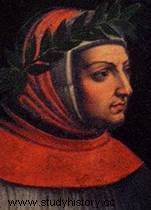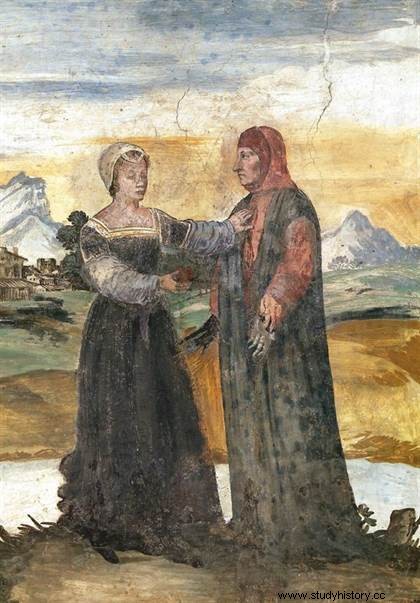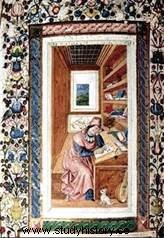 Petrarch (1304-1374) was an Italian poet and humanist , author of an important scholarly work in Latin and a poetic work in the vernacular. Historian, archaeologist, researcher of manuscripts, he was the first of the great humanists of the Renaissance. But his glory rests above all on his poems in Tuscan, the sonnets of the Rimes and Triumphs , composed in honor of Laure de Noves and brought together in the Canzoniere , published in 1470. Considered the first and greatest of modern lyric poets, Petrarch had a lasting influence on all of Europe, from the poets of the Pleiades to Spenser and Shakespeare. It also played a leading role in the advent of the Italian vernacular to the rank of literary language.
Petrarch (1304-1374) was an Italian poet and humanist , author of an important scholarly work in Latin and a poetic work in the vernacular. Historian, archaeologist, researcher of manuscripts, he was the first of the great humanists of the Renaissance. But his glory rests above all on his poems in Tuscan, the sonnets of the Rimes and Triumphs , composed in honor of Laure de Noves and brought together in the Canzoniere , published in 1470. Considered the first and greatest of modern lyric poets, Petrarch had a lasting influence on all of Europe, from the poets of the Pleiades to Spenser and Shakespeare. It also played a leading role in the advent of the Italian vernacular to the rank of literary language.
A dense life
Francesco Petrarca, known as "Petrarch" was born in Arezzo (Tuscany) in 1304 to a notary father and a family of exiles, hunted down by the black Guelphs because of their proximity to the white Guelphs (including the famous Dante). Petrarch followed his family into exile in Avignon in 1312, then studied in Montpellier and returned to Italy to complete them in Bologna in 1320. On the death of his father in 1326, he left Bologna and returned to Avignon, where he receives the minor orders around 1330, which assures him a profit. His return to Avignon was decisive because he met Laure de Noves there in Sainte Claire d'Avignon. He ignites a great passion for her, including after the death of the young woman (1348, probably from the Plague). It inspires part of his work, especially poetry.
 Petrarch however took advantage of his university studies and decisive encounters (such as the Colonna family) to start a collection classic books, which he reads and rereads, annotates and even corrects. Among these works, Roman History by Livy, of which he owned a rare edition in 1329. The following years Petrarch spent them between travels, periods of meditation, writing and research (and love). He was in Flanders and France from 1333 (with his famous ascent of Mont Ventoux, probably around 1336), back in Italy in 1337 (Rome moved him deeply).
Petrarch however took advantage of his university studies and decisive encounters (such as the Colonna family) to start a collection classic books, which he reads and rereads, annotates and even corrects. Among these works, Roman History by Livy, of which he owned a rare edition in 1329. The following years Petrarch spent them between travels, periods of meditation, writing and research (and love). He was in Flanders and France from 1333 (with his famous ascent of Mont Ventoux, probably around 1336), back in Italy in 1337 (Rome moved him deeply).
His reputation began to grow, and he was crowned King of Poets at the Capitol on April 8, 1341, supported by the King of Naples, Robert of Anjou. He became close to other great scholars of his time, such as Boccaccio. Thereafter, Petrarch exercises political functions, in particular diplomatic, and continues his work and his work of research. The Black Death takes many of his friends, and he settles in Milan between 1353 and 1361, becoming close to Giovanni Visconti, then Venice donates him a house where he lives until 1371; he actively participates in the political and artistic life of the city. He ended his life in Padua, where he died on July 19, 1374.
Petrarch, scholar, poet and humanist
The work of Petrarch is first marked by his rediscovery and his promotion of ancient letters, which will profoundly influence the humanists and artists of the modern era. In addition to Livy, he exhumes letters from Cicero, and praises (and studies) Seneca or Virgil. He writes himself in Latin, like his Letters or Africa (on Scipio the African). On the other hand, he fails to learn Greek.
 Petrarch is also a poet, inspired by his mad love for Laura (the Rhymes ). He would even have ordered a portrait and medals of the young woman from the famous painter Simone Martini. He also wrote poems in the vernacular, including the Livre de Chants (Canzionere ) and Triumphs .
Petrarch is also a poet, inspired by his mad love for Laura (the Rhymes ). He would even have ordered a portrait and medals of the young woman from the famous painter Simone Martini. He also wrote poems in the vernacular, including the Livre de Chants (Canzionere ) and Triumphs .
Finally, passionate about the concern for "me", he writes biographies of the Ancients he admires, but does not forget himself with his autobiography, Secretum , where he imagines a Cicero representing his conscience.
Posterarchy of Petrarch
Petrarch can be described as a medieval man, by his references to Saint Augustine or Saint Bernard, his admiration for Dante, the form of many of his works, his meditations on Fortune ,… But he is also a “modern” man, in the sense that he announces (and above all inspires very strongly) what we will call the humanist Renaissance, thanks to his passionate rediscovery of classical authors, and his rejection of certain medieval features (such as Gothic) that he ends up assimilating to an Age of Darkness.
Bibliography
The bibliography on the humanist is plethoric. To situate Petrarch in his time (useful for the CAPES), we recommend the short work by Peter Burke, The European Renaissance (Points Seuil Histoire, 2002). For pleasure and relaxation, it is absolutely necessary to read Against good and bad fortune, prefaced by Anne Duprat (Rivages poche, 2001).
- Petraque, biography of Hugo Doti. Fayard, 1991.
- Humanism and the Renaissance:Anthology by Caroline Trotot. Flammarion, 2009.
